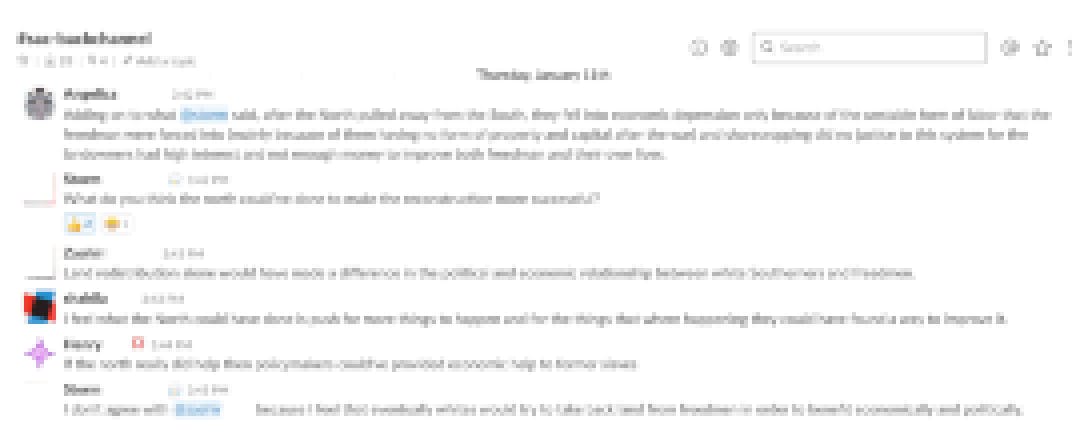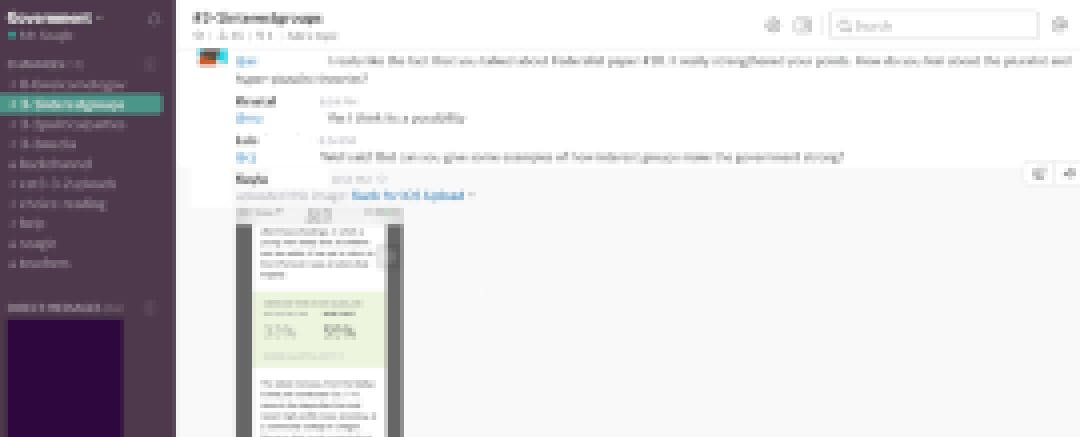If you’ve ever tried a Socratic seminar with your students, or know a colleague who has, this story may sound eerily familiar: After spending the semester shoring up students’ contextual knowledge through multimedia presentations and analyzing primary and secondary sources together, students file in for the big day and gently pick up their Socratic seminar prep packet.
You are feeling confident that, after 20 minutes or so of prep time, students will engage in a lively discussion on the theme of regional identities in the post-Civil War era where they acknowledge one another’s contributions, weave in conflicting viewpoints and dig deeper into the source material to arrive at new conclusions.
Luis, his packet neatly in front of him, sits by his classmates in a circle after the fiasco of moving the desks around. Henry starts. “Was Reconstruction a success or a failure?” he dutifully enunciates with full confidence to the circle. Luis looks at his paper and reads what he wrote, “I think that Reconstruction was a failure because of the Black Codes.” No explanation. Henry states, “I agree with Luis because the Black Codes were really discriminatory toward African Americans.” Angelica now eagerly interjects, “I also agree with Luis because the Black Codes were unjust.”
It goes on like this for the next 30 minutes.
What went wrong? Was it the lesson planning, the students or the fact that public discourse has shifted immeasurably during the past few years? Perhaps it's that sitting in a circle reading from a paper no longer represents the pinnacle of thoughtful debate.
As society becomes increasingly dependent on social media sites for consuming information and as a personal pulpit for ideas and opinions, schools and classrooms need to become the primary source of instruction on how to prepare students for effective offline and online discourse.
Our interest in academic discourse, and by extension Socratic seminars, stems from our work as Hollyhock fellows at Stanford’s Center to Support Excellence in Teaching. The fellowship is a two-year program of professional development designed to combat the teacher retention problem, primarily in low-income schools. Here, we were introduced to a simple framework, organized by grade level and difficulty, on core academic discourse habits. This framework, which some refer to as the “Habits of Discussion,” equips teachers and students with a common language for engaging in classroom discourse.
In our search for an appropriate space where we could promote and monitor our student’s digital discourse, we landed on Slack, an online messaging app used primarily in businesses. While not explicitly designed for the classroom, we have found Slack to be a powerful platform for stimulating high-level online discourse centered around key concepts and core habits of discussion.
Thanks to these Habits of Discussion and Slack, our approach to classroom discourse now is different. Rather than having students participate in a discussion and then offering feedback, which at that point no longer feels actionable, we frontload our discussions by teaching a particular habit, such as arguing from evidence or critiquing, before moving into a Socratic-type discussion.
These brief, frontloaded mini-lessons follow a common structure. First, introduce students to a habit. Second, explain why the habit is important in pushing discussion deeper and when it should be employed. Lastly, provide video of some examples and/or non-examples with the habit in action, followed by a debrief on how to use the habit in a discussion.

To address the perennial challenge of conducting a productive Socratic seminar, we might begin by teaching students like Henry and Luis two discrete habits: acknowledging the contributions of others and digging deeper.
For the second habit, we would use a mini-lesson to explain to students that going deeper requires:
- actively listening to what your classmates are saying
- identifying an idea worth highlighting, and
- highlighting that idea by adding more evidence to support your classmate's contribution
In the same way we scaffold writing, we have found that this level of specificity and scaffolding for discussion is essential to student success. To maximize participation and use of the strategy, we provide discussion stems for the habit. In this case, we might offer, “If we look at document C, this supports what _____________ is saying because…” or “I agree with ____________’s thinking about… because in Document B the author writes…”
Following this framing, the discussion begins. While we expect students to employ all of the habits of effective discourse during the discussion, our prioritized habit serves as the focal point of feedback and student reflection.
In our own classroom practice, our modules are tied to a habit of discussion and each unit centers around a debatable and often contentious essential question. For example, “Is Congress Broken?”, “Was Reconstruction Unsuccessful?” and “Did Women Experience a Renaissance?” At the conclusion of each module, students engage in a Slack conversation with their classmates and, in our specific context, across both of our schools through a shared “Slack classroom.”
Using Slack, students post an initial reaction to a prompt and provide reliable evidence from classroom texts and/or online sources and engage with others by replying to other students’ posts. They use the discussion stems explicitly taught in class to build on posts they agree with or critique the ideas of others, all within the boundaries of respectful discussion norms.

The Slack experience enhances student participation in Socratic Seminars, a summative assessment where students deliberate in person and alongside classmates who engage in a backchannel chat on Slack. Rather than simply discuss their findings and debate, students are pushed to use their academic discourse habits to deliberate and find consensus and compromise. During the discussion, students are using Slack to post clarifying questions, challenging the reasoning of others, linking relevant multimedia sources to promote a deeper conversation or pushing the conversation in a different direction.
This approach has helped our students better understand how to appropriately participate in online discourse while deepening their content knowledge. The recent work of Stanford’s Sam Wineburg alludes to the fact that students need information assessment tools to successfully navigate the unreliable nature of online discourse.
In an era where social media perpetuates disinformation at a dizzying pace, it is incumbent upon all of us to prepare our students with the knowledge and skills to be reflective participants in a reactive digital world.


